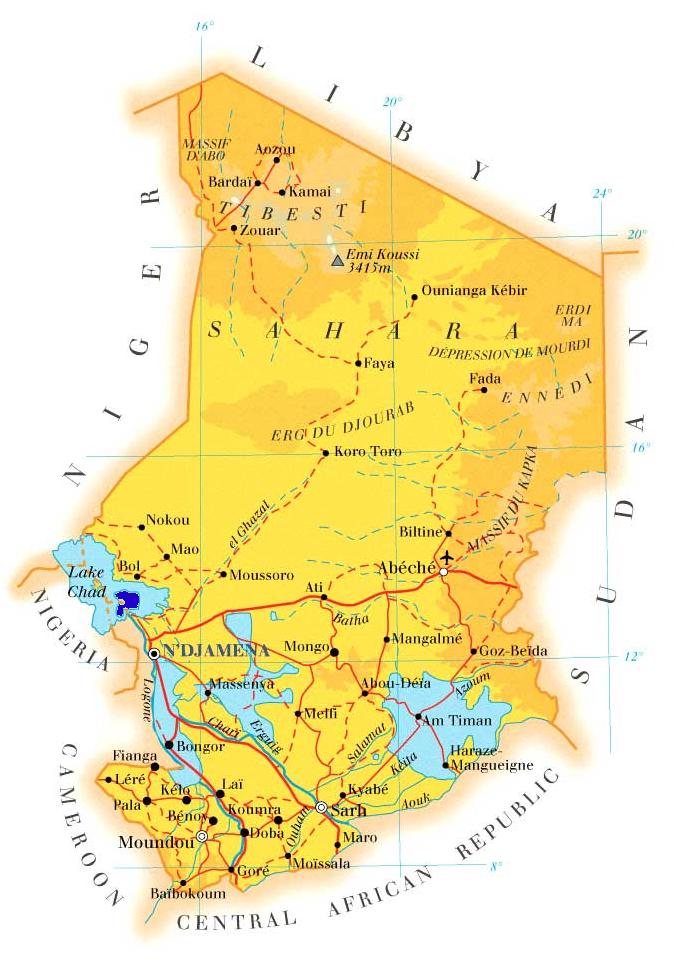About Tchad
Tchad is a country of variety. The far north consists of arid mountains which leads into the sa ndy Sahara which stretches from there to Lake Tchad just north of the capital, N’Djamena. Moving south the land gradually changes into what is known as savannah, with sparse tree growth dotting the land. The very southern tip has considerably more vegetation and forest and is very close to the tropical rain forests of Central Africa.
ndy Sahara which stretches from there to Lake Tchad just north of the capital, N’Djamena. Moving south the land gradually changes into what is known as savannah, with sparse tree growth dotting the land. The very southern tip has considerably more vegetation and forest and is very close to the tropical rain forests of Central Africa.
Southern and central Tchad contain many flood plains making travel very difficult during the rainy season which lasts from April to September. During this time the heavy rains cause the two main rivers, the Logone and the Chari, to overflow their banks providing natural irrigation for rice, which is a staple food for many. These two rivers flow north into Lake Tchad, a very shallow lake reaching only 15 ft deep at the most. The lake consists of 2 basins, the southern of which the rivers flow into. However there has not been enough rain in the past 20 yrs to fill the northern basin causing famine for the communities surrounding it who depended on the fish for sustenance.
The weather to is harsh, ranging between 20C and 45C. During the rainy season (south/central) it is very humid ranging between 25 and 35C in most areas. Around December and January a phenomenon known as “harmattan“ occurs. This is great quantities of dust caused by desert storms, caught in the air which blocks out the sun’s heat for as long as 4 weeks causing the night time temperatures to plummet to a bearable 15C. For the following 4-5 months however temperatures rise to over 40C daily and cooling to barely the mid 30’s over night. Late April is the worst however as these high temperatures are combined with the humidity of the coming rainy season.
The northern desert regions however are quite dissimilar, while not receiving the rain and humidity the climate is quite consistent. Though they do not receive the cooler rainy season and the hot dry season, each day contains highs consistently around the 40C mark while each night can reach the low 20s or even as low as 11C.
The political situation has seen its ups and downs and remains one of the more insecure and difficult countries to live in. Tchad received its independence in 1960 which was followed by moderate stability and progress until the 70’s when corruption infected the government. That government was over thrown and much turmoil and strife has ensued until recent years. The current government re-established elections in 1996 and was re-elected. It has also attempted with measured success to put an end to internal strife, however local rebel opposition does continue on a small dispersed scale. Due to the recent discovery of oil and current development there of should provide for some economic stability and growth. The positive effect of which should help the government to fulfil their desire to provide basic health and education.
Missionaries in the country have been trying to meet these needs since 1927. It is by God’s grace that Tchad remains open to the Gospel under a tolerant Muslim government. Tchad is very strategic and unique in northern Africa as many of these countries are closed to the Gospel. It is bordered by countries like Libya, Nigeria, and Sudan where many Christians are persecuted and loose their lives for their beliefs. Evangelism and discipleship are key to spearheading the Gospel into northern Africa as Tchadians are able to reach their neighbours with the Gospel. The nomadic loop also reaches from Chad to cross all of west Africa and able to carry the Gospel to those nations Many mission organisations are involved in literacy work, teaching reading skills and putting the many languages into written form. A print shop in the south was also started to provide written material in many of the local languages. Missionaries have also provided wells for clean water while teaching the skills to do so themselves. Teaching is also done is such areas as basic hygiene, family planing and improved methods of agriculture that are within their means. A large 250+ bed hospital was established with an out patient care similar to one of 4x one that size in North America. It is now staffed by Tchadian doctors trained overseas. Many dispensaries have also been established in outlying areas providing basic health care to those who can’t or don’t need the attention of a hospital. These are visited by a doctor on a regular basis to meet extended health needs.
It is our goal to be a part of these efforts as, at present there is no one dedicated to the many technical needs of these much needed ministries.